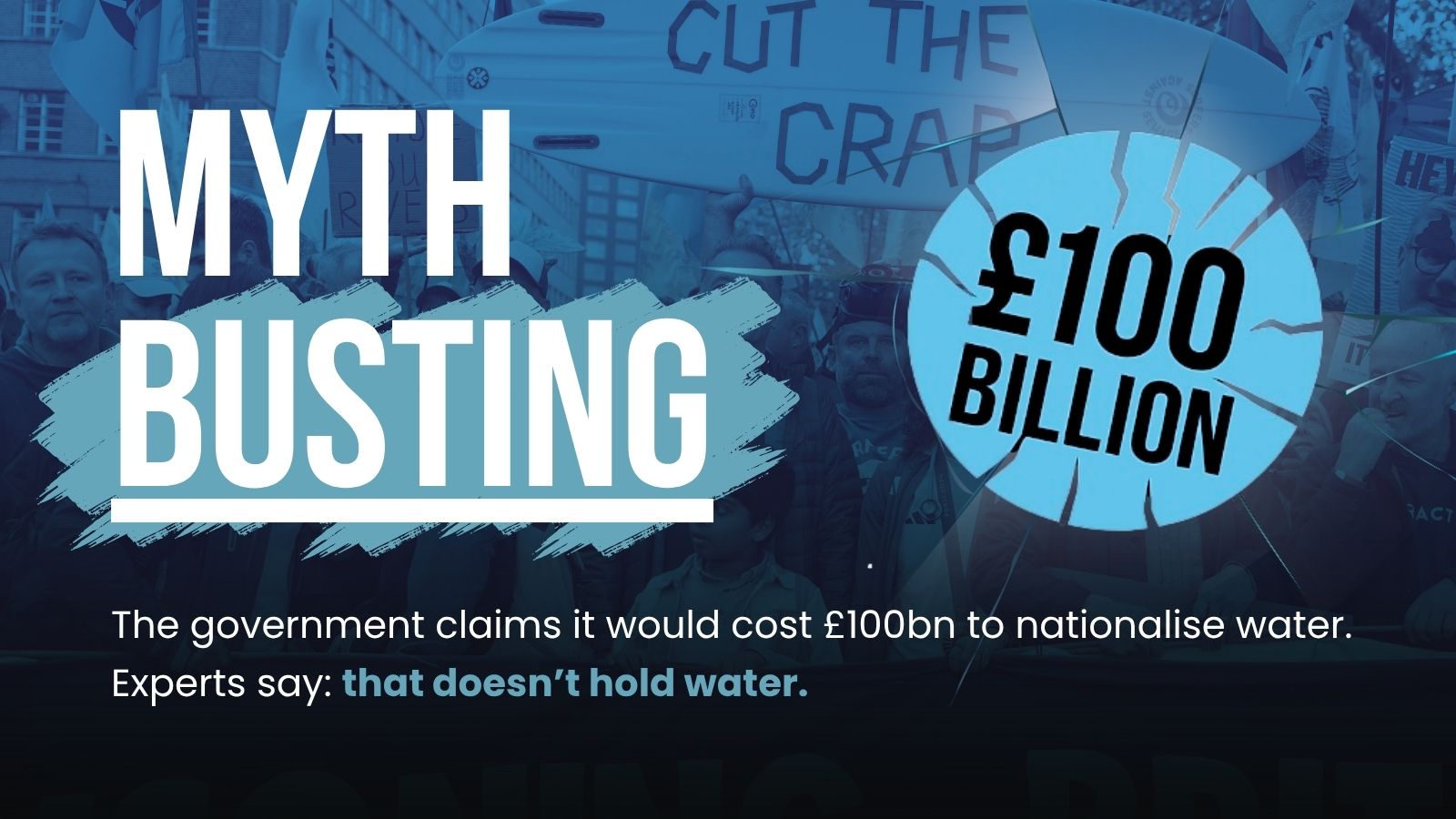
Myth Busting: Would it really cost £100 billion to bring water utilities into public ownership?
By Dr Samir Seddougui
Whenever the conversation turns to the cost of nationalising the water industry or even just exploring public benefit and ownership models instead of continuing with deep privatisation, the government references the scarily high figure of £90-100 billion to dampen public support.
On 16 September, Defra released a short policy paper outlining the rationale behind its estimation that nationalising the water industry would cost approximately £100 billion. A similar number was reached in a 2018 Social Market Foundation report paid for by four water companies (Anglian Water, Severn Trent, South West Water and United Utilities). The Social Market Foundation’s estimation takes the RCV from 2018 which was estimated at £64 billion and then added premiums for acquisition, so presumably their estimation would be even higher now.
Defra based this on three assumptions that:
- the value of Water Companies should be tied to their Regulatory Capital Value (RCV);
- the government would absorb equity and debt; and
- no discounts or premiums should apply.
Inflated Economics?
Let’s be clear: this isn’t rigorous economic analysis. It is a simplistic and unrealistic theory being relied on by the government to justify not taking decisive action in public and environmental interests by putting failing companies like Thames Water into a special administration regime. What it protects are investors and an unsustainable cycle of debt servicing.
Professor Ewan McGaughey, professor of Law at King College London and co-author of the People’s Commission argues that public ownership is an inexpensive solution, contending that the true cost is closer to zero as a more accurate market valuation would account for performance and financial failures.
As Economics Professor Sir Dieter Helm puts it, Defra’s estimate is “misleading, simplistic and wrong”. In his analysis published on 22 September, Helm sets out why each of Defra’s assumptions is wrong and goes on to explain why special administration for a failing water company such as Thames Water would make sure the business continues on a sustainable basis, giving it “breathing space” before, the special administrator would “almost certainly achieve a price which is at a significant discount to the RCV” with debt holders taking a “haircut”.
When valuing a utility company such as Thames Water, RCV is only one factor a buyer would weigh. Helm argues that a company’s failure to maintain assets and its debt levels are central to any realistic valuation. The People’s Commission notes that RCV ignores another glaring reality: water companies have extracted £83 billion in dividends to shareholders. Karol Yearwood at the University of Greenwich has described the privatised water industry as a “cash machine for investors”. Today, the biggest beneficiaries are historic shareholders and debt holders keen to cash in on the roughly £17 billion debt Thames Water has been allowed to rack up.
Since privatisation 32 years ago, Thames Water has handed £7.2 billion pounds to shareholders, while neglecting essential upgrades leaving the public with failing pipes, sewage discharges, and degraded waterways.
Defra also glosses over Thames Water’s massive debt pile and fines including a record-breaking £123 million penalty this year for serious pollution that continues to devastate our rivers. Polluters should foot the bill, not taxpayers. Under a special administration regime, customer payments would flow to court-appointed administrators to fund the operation of essential water services, instead of being paid out to as returns to shareholders who would go to the back of the queue, making the process far less of a financial burden than Defra claims. In fact, as Helm points out, it would exceed the cost of running the business.
The cost of and case for special administration
The Government says that special administration of Thames Water would cost the government £4 billion. This is also overblown: on Helm’s analysis, the Government should recover its costs from the sale of Thames Water which, when offered for sale, would receive bids way in excess of £4 billion. The net cost to the Treasury should be zero.
Helm also explains why special administration is not nationalisation, as it is often misleadingly labelled or conflated as a tactic to avoid having to use it. Special administration is a regime designed specifically to deal with water company failure and it offers the most effective way out of the mess Thames Water is in. It should not be feared but favoured.
Dieter Helm cuts through the noise: “What is needed now is for Defra to put Thames into special administration, instead of putting out simplistic and ill-thought-through “assumptions” to support an implausible, very big round number.”
We are also pursuing a Judicial Review against DEFRA for failing to set out clear thresholds for when a company should be put into SAR. In our view, this failure breaches core public law duties and leaves rivers and communities at the mercy of failing operators. With 16 million customers, some ministers may believe Thames is too big to fail. River Action says it’s too big to be allowed to keep failing. It’s time to put customers and the environment before private profits – by putting Thames Water out of its misery and into a special administration regime.
References
- Becky Malby, Kate Bayliss, Frances Cleaver, Ewan McGaughey, “A fair price to the public for water nationalisation.” The Guardian. 3 August 2025. Accessed here.
- Defra, “Nationalising the water sector: how we assessed the cost.” Policy Paper, 16 September 2025, accessed here.
- The Social Market Foundation, “The cost of nationalising the water industry in England.” February 2018. Accessed here.
- Dieter Helm, “The next episode in the Thames Water saga: Defra’s misleading £100 billion cost of nationalisation and flawed board vetting proposals”. 22 September 2025, accessed here.
- Ewan McGaughey, “How to Clean Up Our Water: Why Public Ownership in Law Costs Zero”. Common Wealth, 5 June 2025, accessed here.
- Kate Bayliss, Frances Cleaver, Becky Malby, “Defra and the £100bn”. The People’s Commission, 18 September 2025, accessed here.
- Karol Yearwood, “The Privatised Water Industry in the UK. An ATM for investors.” University of Greenwich, September 2018, accessed here.
- Tainted Water, “Where Your Money Goes”, Goldsmiths, University of London, 2024, accessed here.
- Sandra Laville, Anna Leach, & Carmen Aguilar García, “In charts: how privatisation drained Thames Water’s coffers”, The Guardian, 30 June 2023, accessed here.
- Sandra Laville, “Thames Water fails to complete 108 upgrades to ageing sewage works”, The Guardian, 10 July 2024, accessed here.
- Environment, Food and Rural Affairs Committee, “Reforming the Water Sector”, House of Commons, 9 September 2025, accessed here.
- Eleanor Shearer & Ewan McGaughey, “Deep Trouble: Fixing Our Broken Water System”, Common Wealth, 11 July 2024, accessed here.
- Sarah Olney MP, “Thames Water: Contingency Plans”, House of Commons, 15 March 2024, accessed here.
- Alex Lawson, “The fate of Thames Water hangs in the balance. So what are its options?”. The Guardian, 22 March, 2024, accessed here.
- River Action, “River Action launches legal challenge against the Government over Thames Water failures”, 30 July 2025, accessed here.






